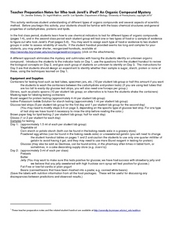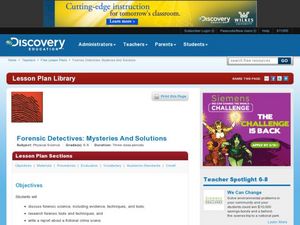Curated OER
The Visible Spectroscopy Expert Witness Problem
In a simulated crime science investigation, chemistry or physics sleuths use spectroscopy to analyze solutions. The lesson gives learners practice making salicylate solutions, using spectrophotometers, calculating dilution amounts,...
University of Colorado
Patterns and Fingerprints
Human fingerprint patterns are the result of layers of skin growing at different paces, thus causing the layers to pull on each other forming ridges. Here, groups of learners see how patterns and fingerprints assist scientists in a...
Curated OER
What is Forensic Science? Website and Worksheets
In this science website and worksheets, students read the definitions and applications of forensic science. They read about DNA, fingerprints, and handwriting analysis. They carry out an ink chromatography experiment and record the...
Curated OER
Drug Analysis Using Thin-Layer Chromatography
Students use forensic science to positively identify any suspected drugs submitted to the laboratory. They determine the identity of the drugs found in the bodies of drug-overdose victims. Students use TLC to identify the active...
Curated OER
Hair
In this forensic science worksheet, high schoolers identify the different parts of the hair. They complete 18 short answer questions on how hair evidence is used in forensics.
Curated OER
Hair Test
In this forensic science worksheet, students answer 3 open response questions about hair evidence collected from the crime scene.
Curated OER
DNA Questions
For this forensic science worksheet, students analyze the characteristics and uses of DNA to complete 26 short answer questions.
Curated OER
Fingerprinting
In this fingerprinting learning exercise, students write short answers to 16 questions about the principles of fingerprinting. They explain how this method is used to identify criminals.
Curated OER
Interdisciplinary Applications of Chemistry Through Engineering in Modern Medicine
High schoolers explore the different techniques used in forensic science. In this chemistry activity, students investigate a fictional crime and identify the culprit. They create a brochure or collage career bulletin.
Curated OER
The Case of Similar Substances
Learners perform tests in the lab to identify an unknown substance. In this physical science lesson, students observe the physical and chemical properties of substances. They formulate a conclusion based on experimental results.
Curated OER
Recovering the Romanovs
Young scholars use DNA to solve an identity mystery. In this biology lesson, students use the Internet to gather information about sex-linked disorders and complete a Punnett square for hemophilia, then examine a handwriting analysis,...
Curated OER
Mission Possible
Students, in teams, solve a crime using forensic lab techniques. They apply lab techniques to a real life situation using a crime scenario that takes place on campus. Sample activities include Blood, Fiber, and Hair Lab.
Curated OER
Who Did It?
Students apply the concepts from forensic science lessons to do a lab. They solve a mystery using experimentation and observation. They write a technically correct lab report.
Curated OER
Hair Test
In this forensic science worksheet, students write an essay about 3 open response questions presented about hair evidence shown on the photo.
Curated OER
Guide to Reading Prints
In this forensic science learning exercise, students read a guide to analyzing fingerprint evidence and answer 3 short answer questions about it.
Curated OER
Hair Test
For this forensic science worksheet, students write an open response to 3 short answer questions on hair evidence collected at the crime scene.
Curated OER
Hair Test
In this forensic science worksheet, students write an open response to 1 question on hair evidence photo taken from the crime scene.
Curated OER
Fingerprint Identification 1
In this forensic science worksheet, learners classify 8 fingerprint marks according to the correct type. They also identify the unique ridges on 2 prints.
Curated OER
Fingerprint Identification 2
In this forensic science worksheet, students examine and identify the fingerprint pattern of 12 fingerprint samples. They classify them as arch, whorl or loop.
Curated OER
Hair Test
In this forensic science worksheet, students write an open response to 1 question about hair evidence collected from the crime scene.
Curated OER
Hair Test
In this forensic science activity, students write an open response to 2 questions about a picture of hair evidence collected from the crime scene.
Curated OER
Hair Test
In this forensic science worksheet, students write an open response to 3 questions posed about hair evidence in the crime scene. They explain where and why the samples are most likely found.
Curated OER
Who Took Jerell's iPod?
Students investigate various substances to determine the perpetrator of a crime. In this biology lesson plan, students test for the presence of organic compounds in various samples. They identify an unknown substance based on its...
Curated OER
Forensic Detectives: Mysteries and Solutions
Students examine forensic science. In this video based lesson, students examine the tools and techniques of forensic science. They write a report about a fictional crime scene from the Discovery video.

























